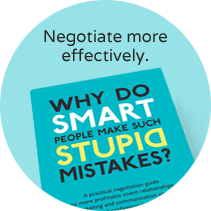Insights

Why is saying ‘no’ so hard?
You are sitting in a restaurant and the waiter or waitress asks “is everything alright?” Even if things aren’t alright many of us say “fine” and then turn to our dining companion and explain what it is that you’re not happy about – the food or the service. Why do we do that? Why didn’t we tell the truth to the waiter? Is it because we can’t be bothered, we’re avoiding confrontation or perhaps don’t want to embarrass ourselves or our companion? Chris Merrington, author of “Why do smart people make such stupid mistakes?” shares some strategies and ideas of why we often avoid saying no and the massive benefits of saying no appropriately in our business and personal lives.
In my workshops with senior agency teams, I find many agency people are ‘people-pleasers’. It’s like we are wired to always want to say ’yes’. We may have been conditioned from an early age that saying “no” is rude, unfriendly or unhelpful. Yet your ability to say no is a critical part of being assertive, having effective negotiations and simply leading an assertive life and career. Many of us feel guilty saying ‘no’. You’re not a bad person for saying no. Sometimes we need to prioritise our needs over others. It’s not that we are being selfish.
There are some people who will use tactics to make it really hard for us to say ‘no’ so we end up saying yes to them. Examples of such tactics include whining, bullying, guilt and compliments.
Warren Buffet said “What we learn from history is that people don’t learn from history.”
What’s the problem if we’re always saying yes? The danger is it will set a precedent. If it’s something we don’t want to do, because we’ve said yes, it’s likely we end up doing it, begrudgingly. Saying yes to everything tends to reduce other people’s respect for us. Once they think you’re a jerk, they’ll always think you’re a jerk. When you do say no often there is a power shift towards you. How much is your ‘yes’ costing you?

Surely, we all have the power to say “no”? If a client is trying to drive our price down do you have price integrity and hold your price, do you drop your price or do you propose another solution? No ifs, no buts, if the client doesn’t have the budget then offer a lower priced alternative, or take out some value. As if by magic the client often finds the extra money. It was just a ploy by the client.
Sometimes the client will walk away. There’s always that risk. That’s business. You need to be prepared to lose some business. Not all clients will be able to afford your price. Don’t try to appeal to everyone or go for the lowest common denominator. Marks & Spencer shouldn’t try to appeal to Lidl or Aldi customers. Which are you in your marketplace? There is no right or wrong – it’s about knowing who your customers are. Your price needs to reflect your worth or your value. Are you worth it? I recently helped a client with their pricing to understand their value and their impact on their customers. When they realised their value they decided to increase their fees quite substantially.
Here are 7 tips to help you be more comfortable saying no.
- How do you say no when appropriate? Say it assertively in a clear and direct voice. Stay calm with an even voice. Be assertive with the right body language. With no apology please. Explain why, if it’s appropriate. Give alternatives if relevant. Anticipate what your client might say and plan your response(s) in advance. You can also pre-empt the client’s response and head it off beforehand.
- Ensure you have the right relationship with clients and customers. You need a peer to peer relationship based on respect not a buyer – supplier relationship which is transactional. Saying no can be very hard in emotional and/or personal relationships such as in the case of a parent saying no to their child. Sometimes we need tough love. We say no because it’s right long term as opposed to saying yes because in the short term it will lead to a quiet life. That just builds trouble for the future.
- Don’t be too quick to drop your price, you may later regret it. Be clear who your ideal client is and also who your non-ideal client is. Do what’s right for your business long term rather than short term. (never let short term greed get in the way of long term greed!!)
- Have the right mindset based on confidence and knowing what you provide is excellent. Be clear what’s in your sweet-spot and what isn’t. Concentrate on what you’ll be brilliant at, not what you’ll be average at. You don’t win business by being average. One danger of taking on work outside our sweet-spot is that you may even compromise the reputation of what you’re brilliant at. ‘Stick to your knitting’ as an old boss of mine used to say.
- Providing different options can be a great strategy. Giving gold, silver, bronze options are psychologically powerful. The customer ends up thinking ‘which’ rather than ‘whether’. If two bottles of wine are offered typically about 2/3 of people choose the cheapest one. If another higher priced bottle is introduced into the mix, roughly 2/3 will choose the middle priced option. That’s not about the wine but the context.
- Next time colleagues or clients ask you to do something which you aren’t happy about, give them a positive no. ‘I can’t do that, but I can do this’. A positive no is collaborative and cooperative whilst you also avoid doing something you don’t want to do. For example “I can’t do it for tomorrow due to a heavy workload but I can do it for next week.”
- Qualify opportunities hard and fast. Beware of being sucked into (or should that be ‘suckered into’?) opportunities. After the first, or at worst the second meeting, with a new prospect, explain to the client or prospect there is now a development fee going forward. Do not give away too much free consultancy, product or service. A taster only.
Do not assume “it’ll be ok”. The business of business is business. You’re in business to make money. Commercial realism needs to be second nature. Wake up. Stop being a pussy-cat! So go on, next time you’re about to say yes when you really want to say no, be brave, be courageous and be prepared for what may happen next!
no comments
